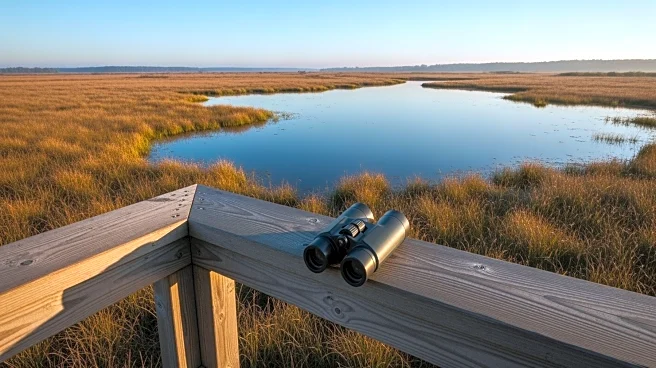What's Happening?
The Trump administration has directed the U.S. Fish and Wildlife Service to allow hunting in many of the approximately 600 National Wildlife Refuges, despite a broader government shutdown affecting other
services. This decision comes as the administration selectively maintains certain operations, such as military pay and anti-hunger programs funded by tariff proceeds, while halting others like IRS taxpayer help lines and EPA permit approvals. The Fish and Wildlife Service has furloughed a significant portion of its workforce, yet remaining staff are instructed to support hunting activities, even as visitor centers remain closed. This directive has raised concerns about potential illegal activities and damage to the refuges, as some areas are left unstaffed.
Why It's Important?
The decision to continue hunting activities in wildlife refuges during a government shutdown highlights the administration's prioritization of certain recreational activities over others, such as organized birdwatching and environmental education. This move could have long-term implications for wildlife conservation efforts, as essential maintenance and habitat management are halted. The National Wildlife Refuge Association has expressed concerns about the impact on wildlife populations and the potential for illegal hunting and trespassing. The situation underscores the challenges faced by conservation groups in advocating for balanced use of public lands and the need for adequate staffing to ensure the protection of these areas.
What's Next?
The continuation of hunting activities during the shutdown may lead to increased scrutiny from conservation groups and calls for legislative action to address staffing and resource allocation in wildlife refuges. The National Wildlife Refuge Association has urged Congress to end the shutdown and address the staffing shortages that have been exacerbated by recent administrative decisions. The long-term effects on wildlife populations and habitat management will likely be monitored closely by advocacy groups, potentially influencing future policy discussions on public land use and conservation priorities.
Beyond the Headlines
The decision to prioritize hunting over other recreational activities during the shutdown raises ethical questions about the equitable use of public lands. It also highlights the cultural significance of hunting in American society and the political considerations involved in managing public resources. The impact on environmental education and community engagement in wildlife conservation efforts may have lasting effects on public perception and support for these initiatives.










